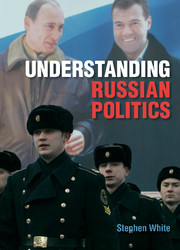Book contents
- Frontmatter
- Contents
- List of figures
- List of tables
- Preface
- Map: administrative units under the 1993 Constitution
- 1 From communist to postcommunist rule
- 2 Voters, parties and parliament
- 3 Presidential government
- 4 From plan to market
- 5 A divided society
- 6 Changing times, changing values
- 7 Russia and the wider world
- 8 What kind of system?
- Notes
- A Note on surveys
- Index
- References
5 - A divided society
Published online by Cambridge University Press: 05 June 2012
- Frontmatter
- Contents
- List of figures
- List of tables
- Preface
- Map: administrative units under the 1993 Constitution
- 1 From communist to postcommunist rule
- 2 Voters, parties and parliament
- 3 Presidential government
- 4 From plan to market
- 5 A divided society
- 6 Changing times, changing values
- 7 Russia and the wider world
- 8 What kind of system?
- Notes
- A Note on surveys
- Index
- References
Summary
A society that was more open to private ownership meant a society that was more divided: into rich and poor, young and old, donor and subsidised regions, heavy industry and the services. Income differences widened spectacularly, and a group of ‘oligarchs’ became among the richest people anywhere in the world, even beyond the international financial crisis that began to affect Russia towards the end of 2008. But millions were still living in poverty, and many of them were concentrated in poorer regions in the south of the country – some of them traditionally Muslim – where as many as a third of the adult population might be out of work. Glaring social inequalities, and a law enforcement system that was badly affected by corruption, meanwhile provided a basis for a high level of crime, including violent crime and contract killings. They also affected the position of women, who had lost the formal equality of the Soviet period but found themselves confronted by new or at least more intractable problems of prostitution, domestic violence and human trafficking.
The USSR was always a diverse society. It was European, but also Asian. It stretched over eleven time zones, bordering twelve other states and three oceans, with much of its northern territory permanently frozen but its southern republics largely desert. It was a mostly Christian society, but also the world's fifth-largest Muslim state, and there were substantial Jewish and Buddhist minorities.
- Type
- Chapter
- Information
- Understanding Russian Politics , pp. 163 - 218Publisher: Cambridge University PressPrint publication year: 2011



